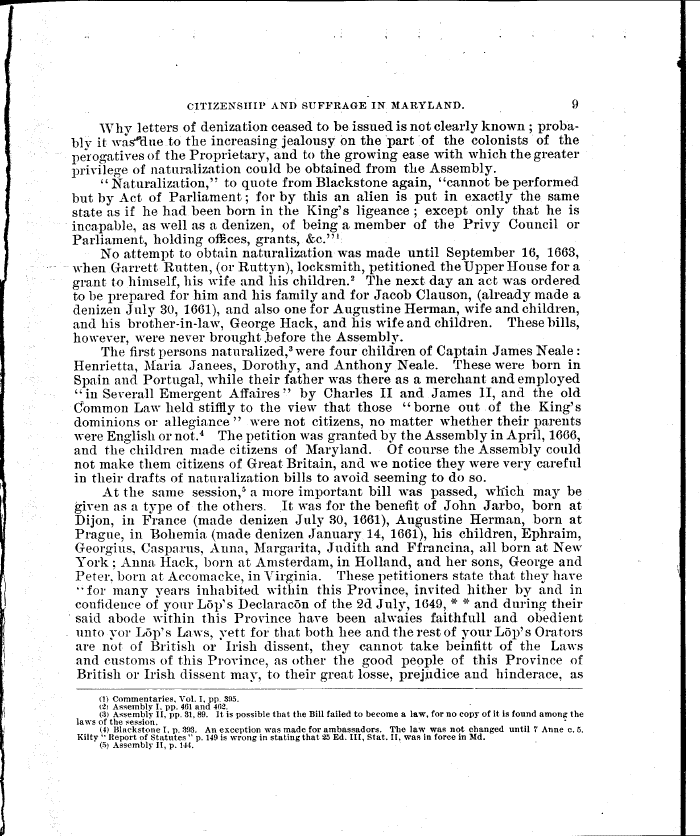|
CITIZENSHIP AND SUFFRAGE IN MARYLAND.
A's'hy letters of denization ceased to be issued is not clearly known; pr
oba-
blv it waedne to the increasing jealousy on the part of the colonists of the
perogatives of the Proprietary, and to the growing ease with which the
greater
privilege of naturalization could be obtained from the Assembly.
"Naturalization," to quote from Blackstone again, "cannot be performed
but by Act of Parliament; for by this an alien is put in exactly the same
state as if he had been born in the King's ligeance ; except only that he is
incapable, as well as a denizen, of being a member of the Privy Council or
Parliament, holding offices, grants, &c."1:
No attempt to obtain naturalization was made until September 16, 1663,
when Garrett Rutten, (or Rutty n), locksmith, petitioned the Upper House
for a
grant. to himself, his wife and his children.' The next day an act was
ordered
to be prepared for him and his family and for Jacob Clauson, (already made a
denizen July 30, 1661), and also one for Augustine Herman, wife and
children,
and his brother-in-lazy, George Hack, and his wife and children. These
bills,
however, were never brought,before the Assembly.
The first persons naturalized,3 were four children of Captain James Neale
Henrietta, Maria Janees, Dorothy, and Anthony Neale. These were born in
Spain and Portugal, while their father was there as a merchant and employed
" in Severall Emergent Affaires " by Charles II and James II, and the old
Common La«- held stiffly to the view that those "borne out of the King's
dominions or allegiance " were not citizens, no matter whether their parents
were English or not.4 The petition was granted by the Assembly in April,
1666,
and the children made citizens of Maryland. Of course the Assembly could
not make them citizens of Great Britain, and we notice they were very
careful
in their drafts of naturalization bills to avoid seeming to do so.
At the same session,5 a more important bill was passed, wlfich may be
given as a type of the others. It was for the benefit of John Jarbo, born at
Dijon, in France (made denizen July 30, 1661), Augustine Herman, born at
Prague, in Bohemia (made denizen January 14, 1661), his children, Ephraim,
Georgics, Casparus, Anna, DIargarita, Judith and Ffrancina, all born at New
York, Anna, Hack, born at Amsterdam, in Holland, and her sons, George and
Peter, born at Accomacke, in Virginia. These petitioners state that they
have
"for many years inhabited within this Province, invited hither by and in
confidence of your L6p's Declaracon of the 2d July, 1640, * " and during
their
said abode within this Province have been alwaies faithfull and obedient
unto yor Lops Laws, y ett for that both hee and the rest of your L6p's
Orators
are not of British or Irish dissent., they cannot take beinfitt of the Laws
and customs of this Province, as other the good people of this Province of
British or Irish dissent may, to their great losse, prejudice and
hinderace, as
(1) Commentaries, Vol. I, pp. 395.
t2) As,embly I, pp. 951 and d5•2.
(3) Assembly I I, pp. 31, 89. It. is possible that the Bill failed to
become a law, for no copy of it is found among the
laws of the session.
(!) Blackstone I, p. 393. An exception was made for ambassadors. The law
was not changed until 7 Anne c. 5.
Kilty " Report of Statutes" p. 1.19 is wrong in stating that 35 Ed. III,
Stat. II, was in force in Md.
(5) Assembly II, p. 144.
|

